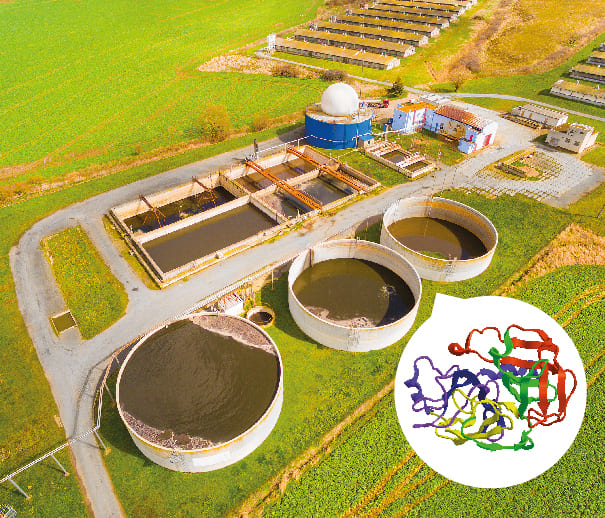
Enzymes Used For Biofuel Production
Types Of Biofuel Enzymes
Are you looking out for the diverse kinds of enzymes used in biofuel production? Look no more as Ultreze has got you back. Here are the types of enzymes used in biofuel production.
Cellulases
Cellulase enzymes break down a complex carbohydrate found in plant cells named cellulose. Cellulose is a significant source of biofuel. By converting cellulose into glucose, it can lead to the production of Ethanol.
Lipases
The lipase enzyme breaks down lipids into fatty acids. Using the Lipases enzyme, fatty acids such as Methyl esters (FAME) can be used as a biofuel.
Amylases
By breaking down starch into simple sugars, Amylase enzymes can be fermented to produce ethanol. Some biofuel production requires starch-based products like corn or cassava.
Hemicellulases
Likewise Cellulases, these are also found in plant cell walls and convert hemicellulases into simpler sugars like Arabinose or Mannose. Later on, these sugars can be fermented to produce biofuel.

Hemicellulases
Likewise Cellulases, these are also found in plant cell walls and convert hemicellulases into simpler sugars like Arabinose or Mannose. Later on, these sugars can be fermented to produce biofuel.
Biofuel Enzymes Benefits
- The use of biofuel enzymes contributes to the efficiency and sustainability of energy resources. But this is not. Here are some other key benefits of enzymes used in biofuel production.
- The usage of enzymes tends to increase the conversion efficiency of biomass into biofuels like ethanol and biodiesel.
- Compared to traditional chemical methods, using enzymes is an environmentally friendly process as it operates under milder conditions such as moderate temperature and neutral Ph levels. Besides this, the byproducts are also less toxic.
- Another benefit of using enzymes in biofuel production is its cost-effectiveness as it enables saving costs in the long term. Compared to traditional fossil fuels, the enzymes used for producing biofuel are economical because it uses diverse feedstocks and the efficiency of production processes.
- The waste generation is also minimized and all thanks to the use of enzymes in biofuel production as they target only specific components in the biomass which in turn leaves behind fewer waste products.
- The product quality of biofuel production is also improved post using the enzymes in the production process. The enzymes used result in better-quality biofuels.
- The enzymes can also be customized to match the features of specific biomass feedstocks which in turn enhances the efficiency of biomass conversion and enables the use of more diverse feedstocks.
Enzymes Used in Biofuels Production
Lipase (Diesozyme-LIP)
Lipase is used for etherification of edible and Non-edible oils to produce biodiesel.
Cellulase (Diesozyme-CELL)
Diesozyme-CELL play a key role in the enzymatic hydrolysis of cellulosic polymers to release monomeric fermentable sugars to produce biofuels.
Lipase Enzymes For Biodiesel Production
Lipase enzymes are constantly used in transesterification as they offer several environmental and economic benefits. Lipases are enzymes that help in breaking down ester bonds especially the long-chain triglycerides to generate free fatty acids, diglycerides, monoglycerides as well as glycerol. Lipases have been divided into three categories depending on their specificity as follows: 1,3-specific, fatty acid-specific and non-specific lipases. A 1,3-specific lipase discharges fatty acids from positions 1 and 3 of a glyceride and then breaks down the ester bond in these positions. In certain specific conditions, lipases are also involved in other catalyses such as acidolysis, alcoholysis, aminolysis, esterification and transesterification.
Are you looking for enzymes?
We're Here to Assist
Frequently Asked Questions(FAQ)
Enzymes offer several advantages in biofuel production, including:
- Increased efficiency of biomass conversion
- Enhanced biodiesel production
- Reduced energy consumption
- Improved environmental sustainability
Enzymes are essential catalysts that accelerate biochemical reactions, breaking down complex organic matter into simpler compounds. In biofuels production, Ultreze Enzymes play a crucial role by facilitating the conversion of biomass into biofuels with higher efficiency and sustainability.
Ultreze Enzymes are specifically designed for optimal performance in biofuel production processes. They improve reaction rates, increase yields, and operate under milder conditions, reducing energy consumption. This results in a more eco-friendly and cost-effective biofuels production approach.
Integrating Ultreze Enzymes into your biofuels production is a straightforward process. Our team provides comprehensive support, including technical assistance and guidance. Feel free to reach out to us, and we’ll ensure a seamless incorporation of Ultreze Enzymes into your production workflow.
